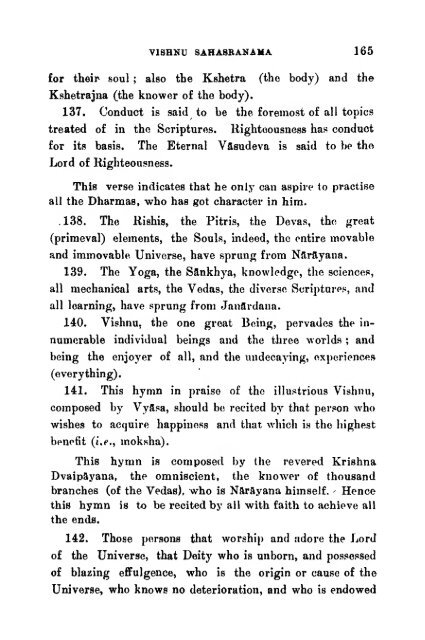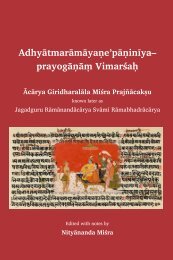Vishnu.Sahasranama.with.the.Bhasya.of.Sankaracharya_text
Vishnu.Sahasranama.with.the.Bhasya.of.Sankaracharya_text
Vishnu.Sahasranama.with.the.Bhasya.of.Sankaracharya_text
Create successful ePaper yourself
Turn your PDF publications into a flip-book with our unique Google optimized e-Paper software.
VISHNU SAHASRANAMA. 165<br />
for <strong>the</strong>ir soul ; also <strong>the</strong> Kshetra (<strong>the</strong> body) and <strong>the</strong><br />
Kshetrajna (<strong>the</strong> knower <strong>of</strong> <strong>the</strong> body).<br />
137. Conduct is said to be <strong>the</strong> foremost <strong>of</strong> all topics<br />
treated <strong>of</strong> in <strong>the</strong> Scriptures. Righteousness has conduct<br />
for its basis. The Eternal Vftsudeva is said to be <strong>the</strong><br />
Lord <strong>of</strong> Righteousness.<br />
This verse indicates that he only can aspire to practise<br />
all <strong>the</strong> Dharmas, who has got character in him.<br />
.138. The Rishis, <strong>the</strong> Pitris, <strong>the</strong> Devas, <strong>the</strong> great<br />
(primeval) elements, <strong>the</strong> Souls, indeed, <strong>the</strong> entire movable<br />
and immovable Universe, have sprung from Nftrflyana.<br />
139. The Yoga, <strong>the</strong> Sflnkhya, knowledge, <strong>the</strong> sciences,<br />
all mechanical arts, <strong>the</strong> Vedas, <strong>the</strong> diverse Scriptures, and<br />
all learning, have sprung from Janflrdana.<br />
140. <strong>Vishnu</strong>, <strong>the</strong> one groat Being, pervades <strong>the</strong> in-<br />
numerable individual beings and <strong>the</strong> three worlds ; and<br />
being <strong>the</strong> enjoyer <strong>of</strong> all, and <strong>the</strong> undecaying, experiences<br />
(everything).<br />
141. This hymn in praise <strong>of</strong> <strong>the</strong> illustrious <strong>Vishnu</strong>,<br />
composed by Vyflsa, should be recited by that person who<br />
wishes to acquire happiness and that which is <strong>the</strong> highest<br />
benefit (i.e., moksha).<br />
This hymn is composed by <strong>the</strong> revered Krishna<br />
Dvaipayana, <strong>the</strong> omniscient, <strong>the</strong> knower <strong>of</strong> thousand<br />
branches (<strong>of</strong> <strong>the</strong> Vedas), who is Narayana himself. - Hence<br />
this hymn is to be recited by all <strong>with</strong> faith to achieve all<br />
<strong>the</strong> ends.<br />
142. Those persons that worship and adore <strong>the</strong> Lord<br />
<strong>of</strong> <strong>the</strong> Universe, that Deity who is unborn, and possessed<br />
<strong>of</strong> blazing effulgence, who is <strong>the</strong> origin or cause <strong>of</strong> <strong>the</strong><br />
Universe, who knows no deterioration, and who is endowed



